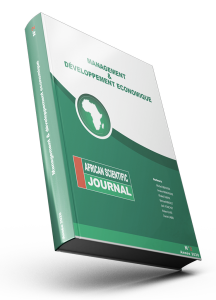Organizational Control and Organizational Change Interaction under Risk-Based Solvency (Solvency II): An Empirical Validation through a Survey of Moroccan Insurance Companies
DOI :
https://doi.org/10.5281/zenodo.17131652Résumé
Résumé
L’article examine empiriquement l’influence du contrôle organisationnel sur la performance financière perçue dans les compagnies d’assurance marocaines, dans le contexte de la Solvabilité Basée sur les Risques (SBR). En mobilisant les cadres du contrôle interne (COSO, 2013) et des leviers de contrôle de gestion (Simons, 1995), nous spécifions un modèle reliant le contrôle organisationnel au changement organisationnel, puis à la performance financière. Une enquête en ligne par questionnaire a été administrée auprès de cadres et collaborateurs impliqués dans la gouvernance des risques, aboutissant à 197 réponses exploitables. Les échelles présentent une fiabilité élevée (alphas ≥ 0,74) et l’analyse factorielle exploratoire valide trois construits latents unidimensionnels : contrôle organisationnel, changement organisationnel et performance financière. Les corrélations sont fortes et significatives. Les régressions confirment que le contrôle organisationnel explique le changement (R² ≈ 0,54) et que le changement explique la performance (R² ≈ 0,55). L’effet direct du contrôle sur la performance, significatif en modèle simple (R² ≈ 0,30), devient non significatif lorsque le changement est introduit, attestant une médiation totale (Baron & Kenny, 1986). Ces résultats soulignent que, sous SBR, l’impact du contrôle sur la performance passe d’abord par la capacité à piloter le changement. Des implications managériales et des pistes de recherche sont discutées à l’aune des spécificités du marché marocain.
Mots clés : Contrôle organisationnel ; Changement organisationnel ; Performance financière ; Assurance ; Solvabilité Basée sur les Risques (SBR) ; Maroc.
Abstract
This study investigates the interaction between organizational control, organizational change, and financial performance in the Moroccan insurance sector, within the framework of Risk-Based Solvency (SBR). Drawing on COSO’s internal control framework and Simons’ levers of control, a conceptual model was developed and empirically tested through a quantitative survey of 197 respondents working in Moroccan insurance companies. The reliability of the measurement scales was confirmed (Cronbach’s alpha ≥ 0.78), and exploratory factor analysis validated the unidimensionality of the three latent constructs. Correlation and regression analyses show that organizational control strongly influences organizational change (β = 0.74, p < 0.001), and change, in turn, significantly affects financial performance (β = 0.75, p < 0.001). However, the direct effect of control on performance becomes non-significant when change is included in the model, confirming a full mediation effect. These findings highlight that, under SBR, control mechanisms contribute to financial performance only through their ability to foster organizational change. The study contributes to the literature by validating the mediating role of change in the control–performance relationship in an emerging context, and provides managerial implications for insurers aiming to balance regulatory compliance with strategic adaptation.
Keywords : Organizational control; Organizational change; Financial performance; Insurance; Risk-Based Solvency (SBR); Morocco.
Téléchargements
Publiée
Comment citer
Numéro
Rubrique
Licence
(c) Tous droits réservés African Scientific Journal 2025

Ce travail est disponible sous licence Creative Commons Attribution - Pas d'Utilisation Commerciale - Pas de Modification 4.0 International.





















